2183. Twenty-five years have passed since humanity discovered it was not alone in the universe. The Milky Way is dominated by the Citadel Council, a multi-species authority that seeks to limit conflict and war and promote peace and trade. One soldier now stands ready to become the first human Spectre, an elite agent with the authority to destroy threats to galactic peace. But their first mission uncovers evidence of a rogue element in the Spectre ranks, and evidence that a powerful, ancient threat is returning to the galaxy after fifty thousand years. With the Council not ready to face this truth, it falls to Commander Shepard to recruit a crew of like-minded allies and expose this new threat.
If video games are about fulfilling fantasies, BioWare's Mass Effect trilogy offers one of the most compelling in the history of the medium: you are Commander Shepard, Space Adventurer. Your surname is set in stone but otherwise you can determine your Shepard's gender, appearance, abilities, sexuality and personality. You then guide your Shepard through a lengthy quest to save the galaxy, but it's up to you how you do it. You can be the ultimate hero, a paragon of honour and justice, or you can be a brutal, sarcastic antihero. Or maybe you just wing it as the fancy takes you. Depending on your deeds and words, entire civilisations will be destroyed, trusted friends may be betrayed or left for dead, and the fate of trillions of lives hang in the balance.
Most RPGs released since the trilogy have been open-world games, offering freedom in allowing you to travel across a vast landscape and mix and match quests and activities, but none have offered narrative freedom and control in this manner. You can see why, as well. It's very hard to pull off, and even BioWare themselves have shied away from trying to do it again. Their Dragon Age series has offered some of the same ideas of narrative control, but constantly changing protagonists and drastically changing locations between games has minimised the same kind of impact.
The Mass Effect trilogy is really one immense game split into three for length and pacing reasons, and the Legendary Edition of the trilogy combines them for the first time into one cohesive package. Every bit of DLC is also included (one optional expansion for the first game excepted, which almost everyone ignored first time around anyway) and all three games have been given graphical spruce-ups and had their load times drastically improved. The first game has also had its combat revamped to better match the latter two games in the series. The result is now the best way to experience the trilogy, certainly for newcomers, and seasoned hands will find a more streamlined experience as well.
The trilogy's most vital feature is that you get to create your character and take them through all three games, carrying all their decisions with them to make for one epic story. The trilogy is ostensibly made up of roleplaying games, although it ends up being more of an RPG-shooter hybrid. All three games are separated into non-combat areas, where you can pick up missions, engage in dialogue and diplomacy and usually some shopping, and mission levels, which are linear maps where you usually make your way to an objective and shoot very large numbers of people along the way. The most important stuff usually happens in the non-combat zones, where you can guide Shepard through conversations using a radial dial and picking your responses. You can also gain "Paragon" and "Renegade" responses by picking kind or aggressive replies respectively. Increase your Paragon and/or Renegade scores and you can unlock special replies, which can sometimes allow you to avoid combat by defusing situations or intimidating an opponent into backing down. This is usually where you'll decide what kind of Shepard you can be, either a hero or an antihero (you can't really be a villain) or some kind of middle ground, although those trying to have their cake and eat it may find they're locked out of the special replies on both ends of the spectrum.
Combat sees you deploy Shepard and two companions and fight in third-person. Combat is inspired by the Gears of War series, with lots of conveniently-placed, chest-high walls to hide behind and fire off shots at the enemy. Combat in the first game is fairly forgettable, improves sharply in the second game and reaches its best in the final title. You can focus on your own fight and let AI handle your companions, or you can pause and give them orders mid-combat. The three games do handle difficulty differently, so I found that Mass Effect 2 could sometimes be challenging on Normal whilst Mass Effect 3 could occasionally feel a bit too easy even on Nightmare, so tweaking difficulty levels to find the right balance is key. However, given the important stuff happens in the dialogue scenes, combat can occasionally feel like a chore. Dropping the difficulty all the way to the easiest level makes combat trivial and allows you to get on with the story.
And it's the worldbuilding, story and characters where Mass Effect shines. Mass Effect is nothing too original - imagine 1990s SF TV classic Babylon 5 mashed up with the 2003 Battlestar Galactica and you're about 90% of the way there - but it almost gleefully mixes and matches its inspirations to create something very enjoyable, if occasionally familiar. The alien races are all memorable and have their interesting foibles and cultural tics, like the third-person-referring Hanar or grumpy space dwarf Voluses, or the Elcor, whose lack of facial expressions and monotonous voices means they have to patiently explain their current emotional state at the start of every sentence. The backstory, painting humanity as newcomers on the galactic stage who are still a bit paranoid about aliens but who are also rising fast in power and influence, angering older galactic civilisations, is also rich and interesting.
The in-game story is also excellent, with you initially chasing down a rogue Spectre who has allied to a renegade race of mechanoids. The stakes get bigger and busier, and you eventually have to sacrifice a trusted friend and pull a gun on another when your relationship goes south. Eventually you discover the real threat, a Cthulhu-esque nightmare of techno-horrors from beyond the dawn of time, and have to fend off their first incursion into the galaxy with a massive space battle and a desperate battle up a burning skyscraper...and that's all in just the first game!
The story ranges far and wide across the galaxy, although players are often baffled by the turn it takes in Mass Effect 2. Trying to avoid spoilers, but suffice to say that there is a two-year gap between the events of the first two games and Shepard's warnings of the return of the Reapers have been disregarded by the Council, forcing them to join forces with a human separatist organisation with a dubious moral past but who have the massive resources needed to take the fight to a new enemy, the Collectors. The game feels like a huge side-quest from the main story arc, but it's also immaculately structured, with Shepard having to assemble a (more or less literal) Dirty Dozen of specialists in various fields, win their trust and then mount an all-out assault on the Collector home base. The brilliance of Mass Effect 2 is how closely it focuses on your relationship with the various characters: mess up your recruitment jobs and you may find some candidates will not help you, or may stab you in the back, or are so disillusioned with you that they will be killed in the final battle. Mass Effect 2 is distinctly odd when looked at in the grand context of the trilogy but it's a brilliant game in its own right.
Mass Effect 3 then becomes an all-out war story, with you right in the middle of a desperate battle for survival with entire planets falling and burning, and a desperate resistance being organised against ridiculous odds. This may sound familiar, but really, Mass Effect 3 does an almost unmatched job of putting you in a ludicrously overwhelming situation and forcing you to make very tough decisions on which the fate of the galaxy will depend. It's enough to almost make you forgive the infamously divisive ending, which tries to bring the preceding ~95 hours of great storytelling to a satisfying close and can't quite manage it. It works and more or less fits the themes of the trilogy, but it also does feel like some of the unknowable mystery set up by the first game has been dissipated by lengthy exposition scenes in the third.
The Mass Effect's trilogy's ace card is its cast of characters. BioWare had superb casts of fun characters in earlier games, all the way back to Minsc and Boo in the venerable Baldur's Gate, but it was in Mass Effect where they really nailed it. Almost every character is excellently-written, superbly-acted (Mass Effect may have cumulatively the greatest voice cast and vocal performances of any video game series, ever) and given motivations and backstory that allow you to understand where they're coming from. A few characters are a bit on the bland side - Ashley, Kaidan, Vega, Jacob - and a couple don't feel like they really fit into a Paragon-based crew (Zaeed) or a Renegade-based one (about half the rest), but overall they're a great bunch. And of course Tali, Garrus, Wrex, Liara and Javik are among the best, most entertaining AI companions you could wish for in any game. There's also a few who might annoy at first or don't appear to do much, but gradually reveals themselves to be great picks (Jack, Samara, EDI, Grunt). Forging friendships or even romances with these characters, or encouraging hook-ups between their ranks, is amusing.
So far, so good. But there are some issues. The first is that having all three games and their DLC in the same package creates some weird pacing problems, particularly in how you access the expansion missions. Arrival should really only be done after the final mission in Mass Effect 2 (it acts as a bridge to Mass Effect 3), but it's possible to trigger the mission a lot earlier and it fits very awkwardly into the timeline if you do that. Similarly, the Citadel expansion to Mass Effect 3 should be done as late in the game as possible to ensure you get to recruit the largest possible cast of characters from all three games for a reunion, but the lighthearted, comedic tone of the expansion fits awkwardly alongside the increasingly grimdark-AF atmosphere as the trilogy moves towards it conclusion.
There's also a lot of stuff that the games don't tell you that a newcomer should really know, like how regularly touring the ship between missions can unlock new conversations with your companion characters and open up opportunities to gain Renegade or Paragon points, or unlock new missions or "war assets" for use later on in Mass Effect 3 (Legendary Edition carries forwards more decisions from the first two games to help you in the third).
There's also the fact that although BioWare tinkered with how the OG Mass Effect works, they don't bring it fully in line with the other two games. Mass Effect is an RPG with a shooter combat mode, whilst Mass Effect 2 and 3 are much more shooters with RPG conversations. The difference is that Mass Effect has non-combat skills and more areas where combat and conversations mix, whilst the other two games only have very modest skill trees and much more clearly delineate their non-combat and combat areas. Mass Effect feels a bit out of keeping with the other two games and not fully integrated into how most of the series works, so the unified experience of playing all three games remains uneven (although less on this time around).
There's also the issue with minigames. Mass Effect 1 and 2 have laborious minigames for lockpicking and hacking, which are both tedious and should be dumped. Mass Effect 3 swaps them out for it simply taking a while and having to make sure nobody's shooting at you at the time. All three games also have an exploration mechanic which they handle differently. Mass Effect 1 has you driving around planets in the Mako, an inexplicably bouncy tank, looking for minerals and (very rarely) shooting bad guys. There's also identikit buildings - seriously, it's worse than Dragon Age II - you can sometimes clear out of enemies and loot. Exploring all these optional planets takes forever (literally 50% or more of Mass Effect 1's total playtime if you're going for an exhaustive run) and isn't much fun.
Mass Effect 2 ups the ante with mineral scanning, which means you sit in orbit around planets and move the mouse around looking for minerals. It sounds and plays very dull, but is important to build up minerals for the final battle in the last game. Again, if you go for an exhaustive, 100% playthrough you will probably spend at least five hours accruing far more resources then you will ever need.
Mass Effect 3 has a much faster and more modest scanning game where you go looking for war assets to use against the Reapers. It's a bit more hit and miss, but it's fun to track down missing fighter squadrons or a damaged cruiser which can they rejoin the fleet for the final battle.
Another issue is that some storylines have not aged gracefully. Various cliches like genius autistic characters (who are then subjected to abuse and torture), wish-fulfilment hot alien space babes (some of the costume choices in the game were corny when the games came out, let alone now) and villains who are villains because villains rear their head from time to time and will make you roll your eyes as often. The games do improve immensely over this, sometimes fast enough for the third game to mock some of the decisions from the first.
The biggest weakness of the trilogy is probably how it is divided into distinct "roleplaying" and "shooting" modes. The meat of the game is in the roleplaying sections and the shooting can sometimes feel rote and phoned in, a simple way of adding "more gameplay" to the series. The more hardcore RPG fan, especially those familiar with BioWare's earlier Knights of the Old Republic SF RPG, will bemoan the way tactical, squad-based combat has transformed into real-time twitch shooting. The games sometimes awkwardly move between the two modes and it can be odd seeing a Paragon Shepard extolling the value of all life and then five seconds later is gunning down forty enemies in rapid succession, gaining achievements for the number of people they massacre and set on fire. At its weakest, the trilogy can feel like a very-well written and characterised adventure game that is broken up by an shooting gallery minigame. Combat does improve across the three games, although the ability to split "run," "cover" and "use" into three different commands would make things even better.
If you've never played the Mass Effect trilogy before, then Mass Effect: Legendary Edition (****½) is an easy sell. One of the greatest video game stories ever told with one of the single finest casts of characters in video game history, with some genuine weight and consequence to your decisions. The workmanlike combat and tedious minigames can be borne for the sake of just spending time in this excellent world, and the negatives do generally clear up as the trilogy continues. If you're already a hardened Mass Effect fan, than Legendary Edition clears up some inconsistencies, puts all three games in a handy launcher, smooths out the process of carrying your character and decisions through all three titles and adds graphical and control improvements that make the experience just more enjoyable. Mass Effect: Legendary Edition is available now on PC, PlayStation and Xbox.
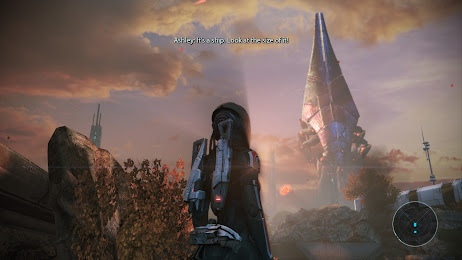

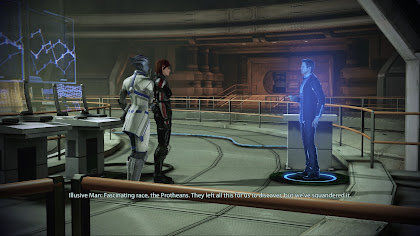

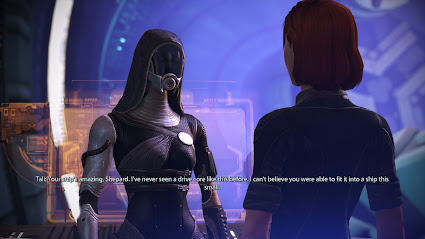


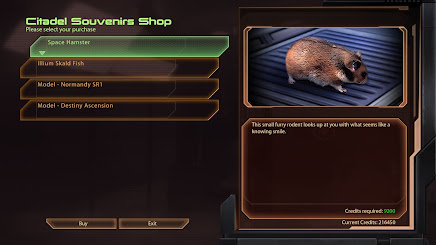
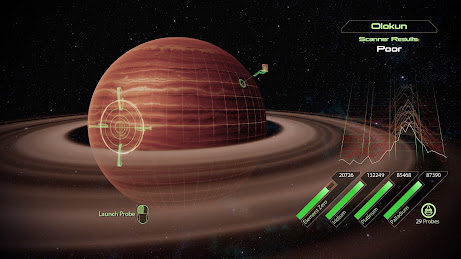



1 comment:
This trilogy feels like an eerie foreshadowing of the Star Wars sequel trilogy: A first installment completely devoid of original story ideas (someone should make a statistic about exactly how many sci-fi stories recycle the "protheans"/"prometheans" concept), but working tolerably well in the entertainment department; a second installment chucking out lots of ideas from the first and aiming for higher-level storytelling, delivering a handful of memorable moments while overall being a mess; a third installment once again disowning stuff from the previous and delivering an universally panned ending.
Myself, I could never get past how the first game introduced the Reapers as indestructible (except when they inexplicably materialize their souls so that the main character can conveniently gun them down), and then had the third game feature a traditional war setting where the Reapers somehow failed to instantly win.
Post a Comment